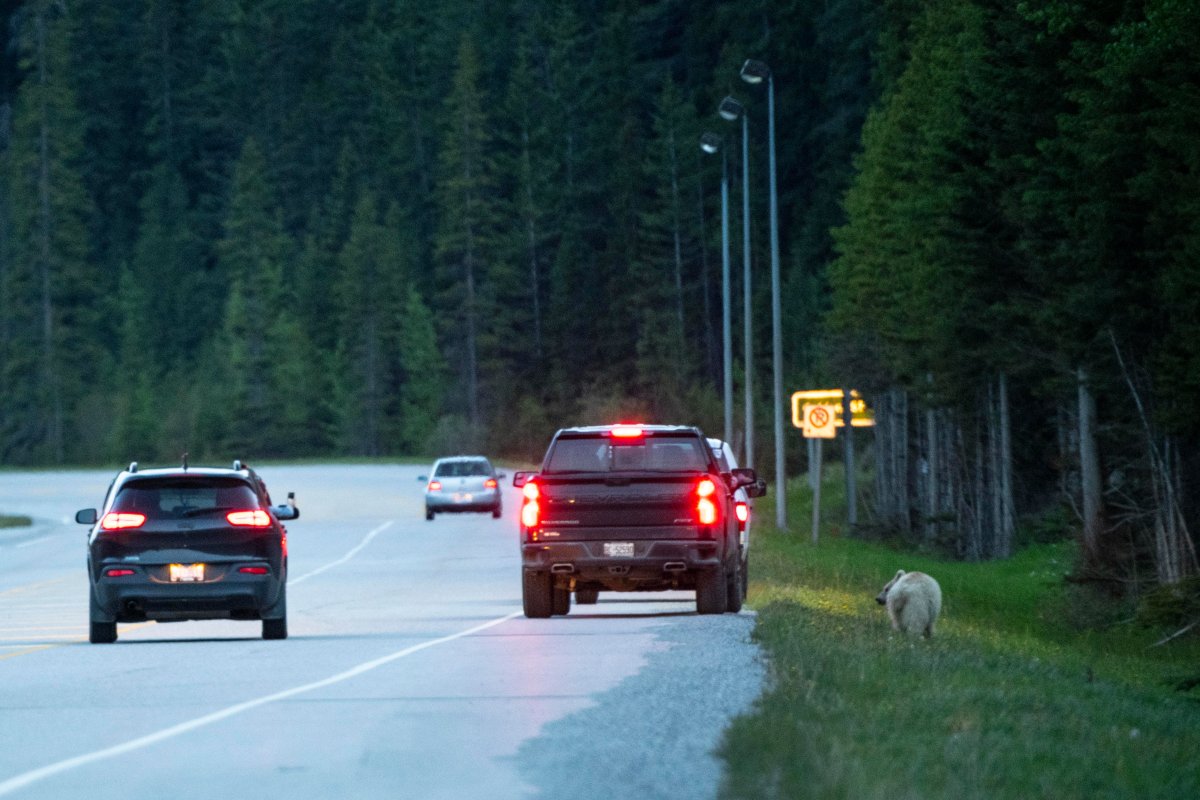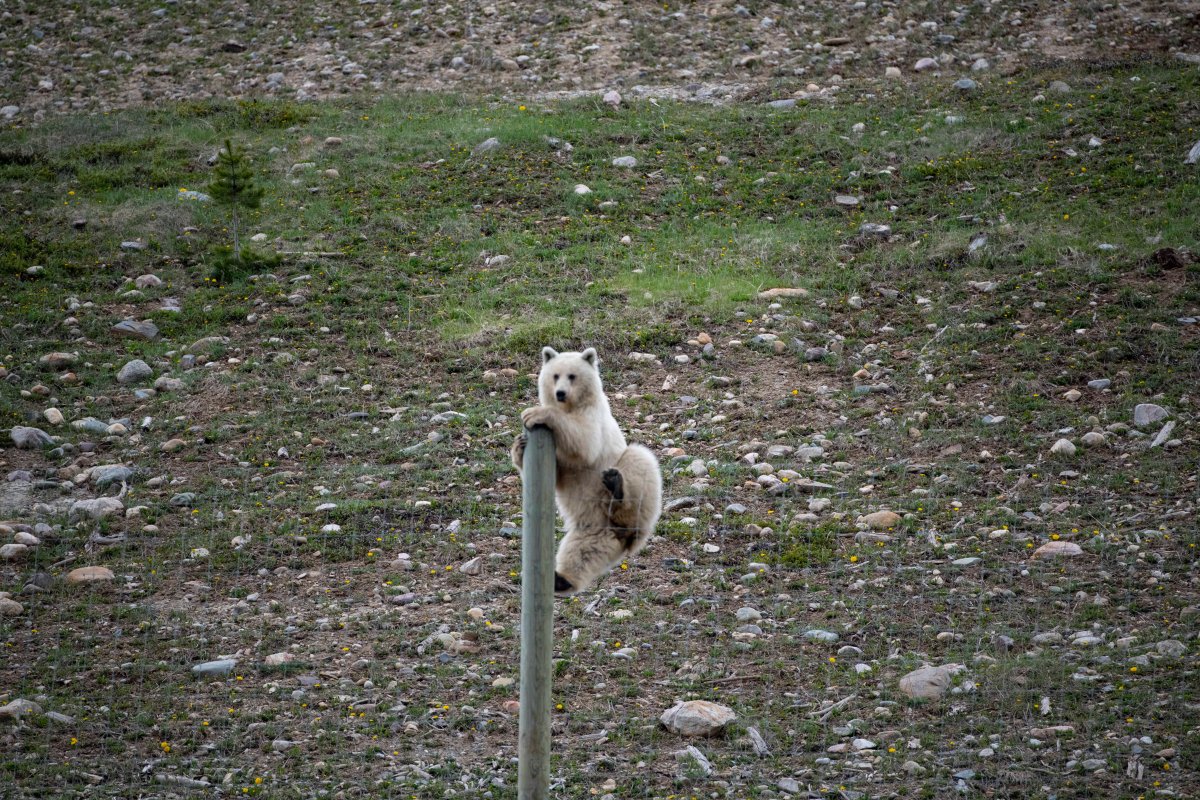A well-known white grizzly bear was injured and her two cubs killed in separate incidents involving vehicles on the Trans-Canada Highway in Yoho National Park on Thursday.
Parks Canada said at 5:15 a.m., they received a report that the two cubs of Bear 178, also known as Nakoda, had been struck and killed.
Wildlife management staff found the two cubs deceased on the roadway. The mother was also on the road, and was hazed back behind a nearby wildlife fence.
Saundi Stevens, a wildlife management specialist from Parks Canada said the bears had been monitored along the road from June 5th, and staff took action to prevent Bear 178 from spending time on the highway, including repairing the wildlife fence.
“Despite the extensive efforts that we’ve made… this family group returned to the roadside, they climbed over the fence and the cubs were fatally struck on the road,” she said.
Bear 178, a rare, white grizzly bear known locally as Nakoda, lives in Yoho National Park, B.C., near the border with Alta.
Jason Leo Bantle/All in the Wild Photography
Parks Canada said in another incident on Thursday evening, Nakoda was struck and injured by a car near the Lake O’Hara turn off in Yoho National Park.
Wildlife management staff witnessed the collision, and moved her to the other side of the wildlife fence.
“She had normal movement with the exception of a slight limp, but there were no other obvious injuries,” said Stevens.
The bear continues to be monitored.
Stevens noted that bears show a remarkable ability to recover from injuries after being hit by a car.
“I’ve worked with bears for a number of years and seen an extraordinary number of what looked like very serious injuries, and from our perspective, we think that it would be very difficult for an animal to survive and recover from those injuries,” Stevens said.
“But by and large, bears in particular seem to recover really well and continue to live long, healthy lives after serious incidents.”
Life along the highway
Parks Canada said Bear 178 was “very driven” to spend time along the highway, as bears return to areas they know that have familiar and reliable food sources.
Nakoda had experienced a high level of human interaction, making her “overly comfortable” along the Trans-Canada Highway.
The white grizzly bear Nakoda along the side of the highway, with several vehicles pulled over.
Jason Leo Bantle/All in the Wild Photography
Parks Canada wildlife specialists believed lingering snow in the high country, and the added stress of feeding her cubs, prompted Nakoda to return to the highway to find food.
“We’re constantly trying to stay one step ahead of her, but she’s a very savvy bear and she’s just grown up using the roadsides as her habitat. So bears typically often will return to habitats that they know best, and that’s what we are seeing with 178,” said Stevens.
Jason Leo Bantle is a wildlife photographer and has followed Nakoda for the past five years. “It’s an incredibly sad day… Many of us are devastated by her loss,” he said in a statement.
“Nakoda tended to find a living along the busy Trans Canada where she would find lush grasses up against the highway each spring, along with frequenting the rail tracks where grain is dropped from rail cars. These are both dangerous options.”
Bantle added both Nakoda’s mum and sister were struck and killed by vehicles on the Trans-Canada Highway.
Efforts to keep Nakoda safe
Parks Canada began managing Nakoda in 2022 and fitted her with a GPS collar. That year she was relocated away from the Trans-Canada Highway three times to another area within her home range.
In 2023, Parks Canada said the wildlife fencing in Yoho National Park was electrified to discourage Bear 178 from climbing over it. She was not seen along the highway for the rest of the year.
On May 23 this year, Nakoda and her cubs were spotted along the Trans-Canada Highway. In response, Parks Canada reduced the speed limit and introduced a no-stopping zone for a 10-kilometre section of the road.
Parks Canada said they will continue efforts to encourage Bear 178 to use a safer habitat away from roads and the Lake Louise community.
Nakoda climbing over a wildlife fence in the Yoho National Park.
Jason Leo Bantle/All in the Wild Photography
“Unfortunately she just seems very adept and persistent at climbing the fences,” said Stevens.
We’re constantly trying to mitigate and tweak things to see if we can adjust some of the materials we have on the fence, the sites that we find she might be getting through. So it’s a work in progress.”
At this stage Parks Canada is not planning to relocate Bear 178 for a fourth time.



